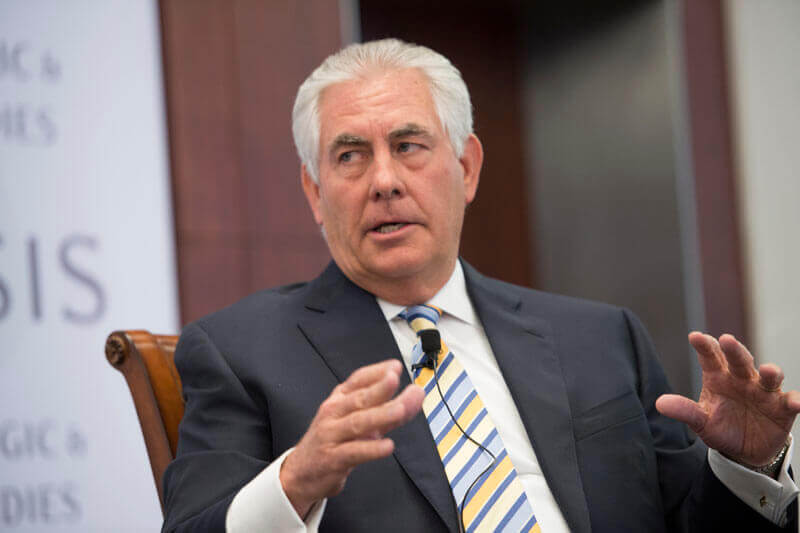Courtney CarsonGHTC
Courtney Carson is a policy and advocacy officer at GHTC, who leads GHTC's US advocacy portfolio.
 Secretary of State–designee Rex Tillerson. Photo: Center for Strategic and International StudiesWednesday’s nomination hearing for Secretary of State–designee Rex Tillerson provided an opportunity for the global health community to learn more about
his views on the United States’ role in international development and global health.
Secretary of State–designee Rex Tillerson. Photo: Center for Strategic and International StudiesWednesday’s nomination hearing for Secretary of State–designee Rex Tillerson provided an opportunity for the global health community to learn more about
his views on the United States’ role in international development and global health.
While the majority of the hearing highlighted policy toward Russia, human rights, global terrorism, and how Tillerson’s professional experience in the oil industry will impact his role as chief foreign policy advisor to the President, Tillerson was also questioned on women’s empowerment, family planning, development aid, and the President’s Emergency Plan for AIDS Relief (PEPFAR).
Here’s what he said:
In response to Senator Shaheen’s (D-NH) question on whether he would support programming to increase women’s empowerment, Tillerson described how these types of programs had been a priority for the Exxon Foundation and cited a program Exxon supported in Papua New Guinea. He committed to continuing these programs, noting “I think it’s an important part of our foreign aid assistance efforts, whether it’s through the USAID [US Agency for International Development] or whether it’s through other opportunities we have in more structured ways.”
Senator Shaheen also pushed Tillerson on family planning and reproductive health, asking if he would pledge to “continue to prioritize quality family planning and reproductive health services for women worldwide, and ensure that resources and access to these programs are not conflated with support for abortion.” Tillerson responded that he was aware that the United States spends roughly a half a billion dollars per year on family planning aid, and he thinks this level of funding is “an important level of support.” Asked whether his answer represented a pledge to continue this commitment, Tillerson deferred, and said he would examine these programs further, if confirmed.
Senator Flake (R-AZ) discussed the role of soft diplomacy with Africa and USAID programs, questioning what works and what doesn’t. Tillerson replied that it is important that US assistance be used to nudge countries toward diplomacy, punish countries when required, and encourage cooperation. He noted that USAID has two important streams of assistance: disaster relief, to address immediate suffering, and development assistance, which is important for achieving lasting change. He said that recently the proportion of disaster assistance relative to development assistance has been growing, which constrains the government’s ability to use aid as a tool for change. He suggested when possible, the United States should tie assistance to behavior change and then follow up. He also said that assistance should be targeted, designed to support American values, and help countries continue their own development. He noted that tying aid to governments meeting obligations is hard to do with disaster relief, and that he understands and appreciates this difference.
When questioned about PEPFAR by Senator Flake, Tillerson called it “one of the most extraordinarily successful programs in Africa.” He described how he saw the success of global health programs up close through Exxon’s work to eradicate malaria in central Africa. He noted that PEPFAR broadly has generated much goodwill from Africa and “recognition of the goodwill and compassionate nature of American people,” calling PEPFAR one of the best projections of America to the African people.
Questioned by Senator Markey (D-MA) on his views of PEPFAR and the Global Fund to Fight AIDS, Tuberculosis and Malaria, and his commitment to strengthening these programs in the years ahead, Tillerson replied: “PEPFAR is one of the remarkable successes of the past decade or more…I think what’s notable about PEPFAR is that there are measurable results…I think it serves as a model for us to look to as we’re thinking about other ways in which to project America’s values, project our compassion to want to solve these threats that are in other parts of the world that by and large we’re not threatened by a lot of this here in this country. Malaria was eradicated decades ago, TB well under control, AIDS—great treatment programs are available to people. Projecting that into other parts of the world is a marvelous way to send a message of the compassion of the American people that we care about people’s lives all over the world. So PEPFAR is a terrific model to look at in the future as we look at other areas that may be useful for us to put additional programs in place.”
At GHTC, we will continue to monitor Tillerson’s views on US support for global health and development aid and urge strong support for programs that further the development and rollout of urgently needed global health technologies.